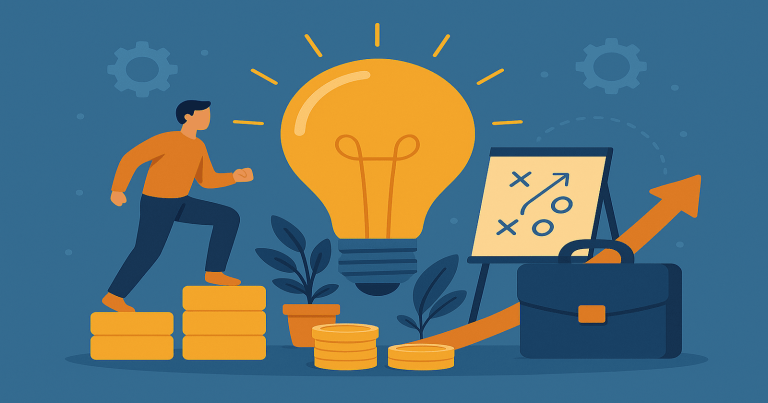The entrepreneurship development process helps people become entrepreneurs by guiding them through each step of starting and running a business. This process teaches them to think like a business owner. It shows them how to choose ideas, study the market, make a plan, and launch the business. In short, the entrepreneurship development process is a way to turn someone with a dream into a real business leader. This process includes many critical stages. It starts with building the right mindset, identifying good business ideas, and learning basic skills. It also includes getting funding, managing teams, handling problems, and growing the business. You must go step-by-step to avoid mistakes and build a strong company. Whether in school or already working, this process can guide you to become a successful entrepreneur.
Meaning of Entrepreneurship Development Process
Before going into the steps, we must understand what this term means. Entrepreneurship development is about helping people become business-ready. It is about improving their skills, mindset, and business knowledge.
What Is Entrepreneurship Development?
Entrepreneurship development means teaching people how to start, manage, and grow a business. It gives them the right tools and training. This includes idea generation, business planning, finance, marketing, legal knowledge, and leadership.
The entrepreneurship development process is a complete journey. It is not just a training class. It starts when a person wants to do something different and ends when they run a successful business.
What Makes It a “Process”?
The word “process” is used because this development does not happen in one day. It moves step-by-step. You learn something, apply it, and then move to the next stage. You go through phases like idea selection, feasibility study, product launch, and team building. These steps help reduce risk and increase the chances of success.
This process is helpful for all types of people—students, homemakers, job seekers, or retired—who want to become self-reliant.

Stages of Entrepreneurship Development Process
The actual entrepreneurship development process happens in multiple steps. Each stage helps you build your business slowly and correctly.
Stage 1: Idea Generation and Awareness
The first stage is all about learning what entrepreneurship is. You explore your interest areas and think of business ideas. You may attend seminars, webinars, and workshops.
This stage helps you answer key questions like:
- What problems can I solve?
- What am I passionate about?
- Is there a market for this idea?
This stage is critical because your idea decides your business journey. You must choose an idea that fits your skills and goals.
Stage 2: Idea Screening and Market Research
Not every idea is a good idea. The second stage focuses on checking if your idea will work. You do market research, talk to people, and study your competitors.
You find answers to:
- Who are your customers?
- What do they need?
- Who are your competitors?
Market research gives you real-world data. It saves time and money. It helps you choose the right product or service.
Stage 3: Feasibility Study and Planning
Now it’s time to check if your business idea is possible. You study the financial side, resources, workforce, and legal needs. You also create a simple business plan.
Your business plan includes:
- Business model
- Budget and cost estimates
- Revenue plan
- Team and roles
- Goals and timelines
A business plan acts like a map. It shows where you are and where you want to go. Investors also ask for your business plan before funding your idea.
Stage 4: Funding and Legal Setup
Every business needs money and legal documents to start. This stage helps you find the right type of funding and complete the paperwork.
You can fund your business through:
- Personal savings
- Family and friends
- Bank loans
- Angel investors
- Startup India schemes
- Crowdfunding platforms
At the same time, you register your business and get GST, PAN, and other licenses. Legal setup is essential so that your business can run without trouble.
Stage 5: Launch and Operations
Once you have funds and documents, you launch your product or service. You also set up a team, start marketing, and serve your first customers.
At this stage, you focus on:
- Hiring the right team
- Branding and social media
- Customer feedback
- Sales tracking
- Supply chain and delivery
This stage is challenging but exciting. You must be ready to solve problems quickly.
Stage 6: Growth and Expansion
Once your business is stable, the next step is to grow it. You can enter new markets, create new products, or develop your team.
Growth comes through:
- Better marketing
- More customer service
- Product upgrades
- Partnerships
- Franchise or online expansion
This stage turns your small startup into a growing business. You keep learning, improving, and scaling up.
Factors Affecting Entrepreneurship Development Process
The entrepreneurship development process does not work the same way for everyone. Some people move fast, while others face delays. Many different factors affect how well someone can grow as an entrepreneur. These factors can come from outside (like the market or economy) or from inside (like the person’s mindset or skills). If you want to succeed, you must understand these factors clearly.
Personal Traits and Entrepreneurial Mindset
Your personality plays a significant role in your success as an entrepreneur. People who take initiative, stay confident, and handle stress are likely to move forward. You need self-discipline, strong willpower, and the ability to learn from mistakes. If you easily give up or fear taking risks, your growth as an entrepreneur slows down.
For example, someone with good communication and decision-making skills can build teams, talk to customers, and attract investors more easily than someone shy or unsure.
Educational Background and Skill Development
Your education and training affect your ability to understand and manage business tasks. If you know finance, marketing, or operations, you can do better in the entrepreneurship development process. Also, entrepreneurial skill development programs run by schools, colleges, and the government help a lot. They teach how to make business plans, talk to customers, and use digital tools.
Even if you didn’t study business, you can still succeed by learning through online courses, workshops, or startup incubators.
Economic and Market Conditions
The economy also affects your success. If the market grows, people spend more, and new businesses can rise quickly. However, customer buying power goes down during an economic slowdown or inflation. This affects sales and profits.
Also, if your business idea fits current trends (like eco-friendly products or online services), your chances of success increase.
Government Support and Policies
Government rules and support systems affect entrepreneurship. Easy access to business loans, tax benefits, startup schemes, and registration processes helps entrepreneurs grow faster. In India, programs like Startup India, Stand-Up India, and Digital India significantly push young business minds forward.
If policies are strict or support is missing in your area, it may become harder to start and grow.
Availability of Finance and Resources
Without money, no business can survive. Getting funds through loans, angel investors, or government grants is a significant factor in development. Also, having access to resources like office space, internet, raw materials, and skilled labour helps build your business better and faster.
People in rural or underdeveloped areas may face delays because these resources are hard to find.
Social and Cultural Support
Sometimes, society and family influence a person’s decision to start a business. In India, parents often prefer that their children choose a safe job over business risks. If your family supports your dreams, it boosts your confidence. But if they stop you, it becomes a barrier.
In some cultures, women face more challenges in entrepreneurship because of gender roles. So, social attitudes matter a lot.
Access to Technology and Innovation
In today’s world, technology plays a huge part in business. You can market and grow fast if you know how to use social media, mobile apps, and digital tools. Entrepreneurs who understand innovation and digital trends always stay ahead.
For example, people selling handmade items online using platforms like Etsy or Meesho are growing fast because they use tech smartly.
Importance of Entrepreneurship Development Process
The entrepreneurship development process plays a vital role in building a strong and growing economy. It helps people start their businesses, earn money, and give jobs to others. In a country like India, where many people want to become self-employed, this process provides the right path to follow.
Builds Job Creators, Not Job Seekers
One of the most significant advantages of the entrepreneurship development process is that it turns people into job creators. People can start businesses and hire others instead of waiting for government or private jobs. This reduces unemployment and gives people more control over their future.
Boosts Economic Growth
New businesses bring in new ideas, products, and more income for the country. As more entrepreneurs succeed, they pay taxes, increase exports, and help local industries. This makes the economy strong from the ground level. It also helps smaller cities and villages grow faster.
Encourages Innovation and Problem Solving
Entrepreneurs always try to solve real-life problems. They think of new ways to make things better. The entrepreneurship development process trains them to examine issues and create innovative solutions. This leads to inventions, new technologies, and better services for people.
Builds Confidence and Leadership Skills
This process teaches people to take responsibility, manage money, lead a team, and face challenges. It builds confidence in students, homemakers, and working professionals. It helps people think big and take charge of their lives.
Supports Government Plans Like Startup India
The Indian government also promotes the entrepreneurship development process through schemes like Startup India, Skill India, and Digital India. When more people follow this process, these schemes become successful, and the country becomes more self-reliant or Atmanirbhar.
Challenges in the Entrepreneurship Development Process
The entrepreneurship development process helps people become business-ready step by step. But the path is not always smooth. Many new entrepreneurs face real problems that stop them from moving forward. These challenges can slow down their growth or even cause them to quit. Knowing these problems in advance helps you prepare better and handle them wisely.
Lack of Capital and Funding Support
Money is one of the first big problems in any new business. Many people have great ideas but no funds to start. Banks often ask for guarantees or business records, which new entrepreneurs don’t have. Even though government schemes like MUDRA Yojana or Startup India exist, many people do not know how to apply. This makes funding a significant barrier in the entrepreneurship development process.
Limited Knowledge and Experience
Most beginners do not understand how business works. They struggle with making plans, handling money, talking to customers, or building a team. They also make mistakes due to lack of experience. Without proper training, they feel lost and confused during the startup journey.
Poor Business Planning
Some people jump into business without doing proper planning. They don’t study the market, the cost, or the customer’s needs. As a result, they run into losses very early. A weak or no plan can lead to failure even before the business can grow.
Fear of Failure and Family Pressure
Many young people in India do not take the risk of entrepreneurship because they fear failure. Family members may ask them to choose safer jobs instead of starting a business. This fear and pressure can hold back talented people from following their dreams.
Legal and Regulatory Problems
Business registration, GST, taxes, and licenses are difficult for new entrepreneurs to understand. Rules and paperwork confuse people who are just starting. Delays and extra costs make the process harder and frustrating.
Lack of Mentorship and Support System
There are no mentors or role models in many small towns and rural areas. People do not get guidance on what to do next. Without support, they make poor decisions. This also affects their confidence and growth.
Marketing and Customer Reach Issues
Many entrepreneurs cannot reach the right customers even after launching a good product or service. They don’t know how to use social media, digital ads, or offline marketing. Without marketing, sales stay low, and business suffers.
Entrepreneurship Development Process FAQs
Q1. What is the entrepreneurship development process?
It is a step-by-step method to help people become business-ready. It includes idea selection, planning, funding, launching, and scaling.
Q2. What are the steps involved in entrepreneurship development?
The main steps are idea generation, screening, planning, legal setup, funding, launching, and growth.
Q3. How do government schemes help in entrepreneurship development?
Schemes like Startup India and MUDRA Yojana offer funding, training, and support for new entrepreneurs in India.
Q4. What skills are needed for entrepreneurs?
You need leadership, communication, decision-making, time management, and problem-solving skills.
Q5. Can students start their entrepreneurship journey early?
Yes. Many colleges now teach entrepreneurship; students can begin with small projects or online businesses.


